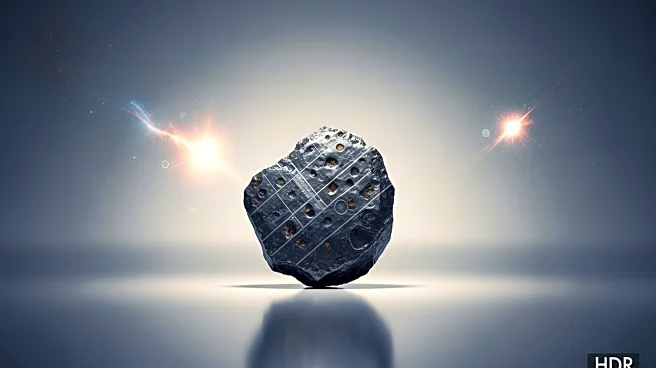What is the story about?
What's Happening?
A new study proposes that Mercury's unusual core composition may have resulted from a grazing collision between two similarly sized planetary bodies during the early years of the solar system. This theory challenges the longstanding belief that Mercury's core was formed by a catastrophic impact with a larger celestial object. The study, led by Patrick Franco and published in Nature Astronomy, utilized simulations to demonstrate that a low-velocity, grazing impact could strip away up to 60 percent of Mercury's original mantle, leaving behind a core-dominant planet. This scenario aligns with Mercury's current mass and iron-mass fraction, offering a plausible explanation for its unique composition.
Why It's Important?
Understanding Mercury's formation provides insights into the chaotic processes that shaped the solar system. The study's findings suggest that grazing collisions were more common than previously thought, occurring in about 20 percent of simulated systems. This challenges older theories that relied on rare, head-on collisions. The research also addresses the 'Mercury problem,' which involves explaining the planet's large iron core and the presence of volatile elements. By proposing a grazing impact, the study offers a statistically plausible explanation for Mercury's composition, contributing to our knowledge of planetary formation and the dynamics of early solar system collisions.
What's Next?
Future missions, such as BepiColombo, are expected to provide more data and samples from Mercury, potentially confirming the new theory. Researchers anticipate that these missions will offer further insights into Mercury's composition and the processes that shaped it. Additionally, the study opens up possibilities for understanding the formation of other planets, as the ejected debris from Mercury's collision may have contributed to the formation of nearby planets like Venus. Continued exploration and analysis of Mercury will help refine models of planetary formation and the history of the solar system.
Beyond the Headlines
The study not only sheds light on Mercury's formation but also enhances our understanding of planetary formation processes. By simulating grazing collisions, researchers can explore how similar impacts may have influenced the development of other planets. The findings highlight the importance of considering less violent, yet significant, interactions in the early solar system. This approach may lead to new theories about the formation of planets with unusual compositions and the role of smaller, frequent collisions in shaping planetary systems.
















